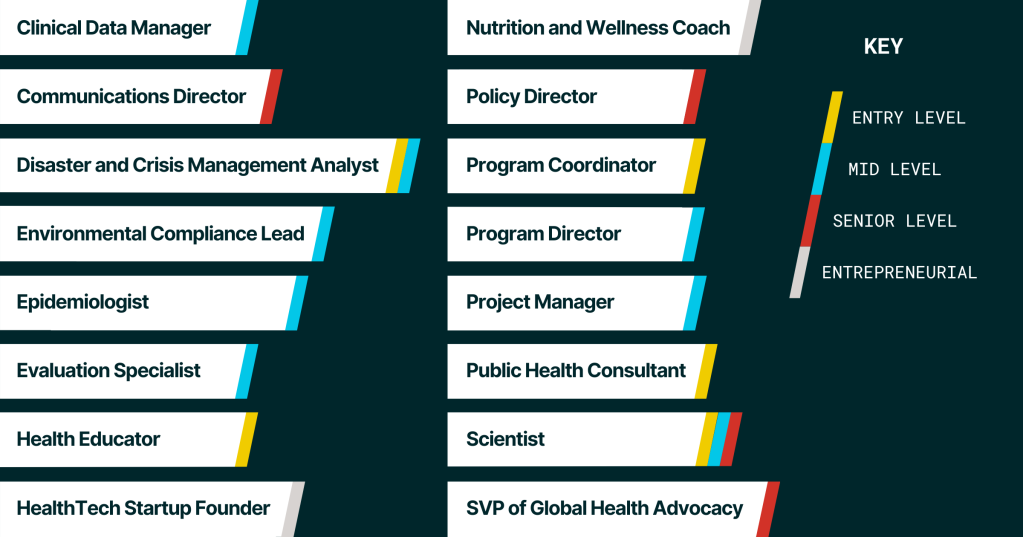Public health careers involve working to improve the overall well-being of communities and populations through various strategies. These careers are crucial for safeguarding and promoting the health of societies on a local, national, and global scale. As there are many levels and work environments, the outlook for jobs within the field of public health is bright. Benefits include:
- Fulfilling careers
- Varied pathways
- Local and worldwide impact
- Job security
- Focus on social justice
“Overall employment of health education specialists and community health workers is projected to grow 12% from 2021 to 2031, much faster than the average for all occupations,” according to the U.S. Bureau of Labor & Statistics.
The COVID-19 global public health crisis highlighted the importance of public health workers. While job growth depends on the role, work setting, and location, there are growth opportunities within the field with various career paths.
Not convinced yet? Here are a few data points to give you an idea of what the industry has to offer and where it’s heading.

Let’s review this skill set together by discussing how public health expertise can be acquired, applied, and transformed into a fulfilling career.
What can I do with public health skills?
Public health professionals perform a wide range of tasks depending on their specific roles and expertise. Let’s delve into some of the different types and responsibilities typically associated with the different public health sub-categories.
Public health administration — Oversee all aspects of a public health organization, including managing budgets, programs, staff, and grants and funding, among other tasks. They may manage human resources, provide leadership and development, liaise with community providers, and educate the public on health issues.
Public health policy and analysis — Specialize in evaluating current policies targeting the health of the public and how these policies can be improved. Specific job duties involve collecting and analyzing data, assessing initiatives, developing new policies to improve an existing strategy, and collaborating with other policy-makers and stakeholders.
Epidemiologist — Analyze the causes of outbreaks in order to treat existing diseases and prevent future outbreaks. Careers involve either conducting research or applying knowledge gathered from research. Epidemiologists who conduct research are employed by universities or aligned with government organizations, such as the Centers for Disease Control and Prevention (CDC) or the National Institutes of Health (NIH).
Environmental health scientist — Advocate for human health and well-being while also promoting a healthy and safe environment. They consider the environment as a whole when analyzing public health issues and provide solutions that aim to improve the integrity of specific environments to improve overall health. This field encompasses navigating long-term environmental challenges, like protecting natural resources, as well as short-term challenges, like natural disasters.
Health promotion and education — Educate the public about pressing public health concerns and promote healthy living strategies. They focus on large-scale initiatives that impact important public health measures rather than one-on-one education or counseling. Their work may involve anything from coordinating a communication campaign about the health benefits of exercise to running a local car seat check for families to advocating that local restaurants add healthy options to children’s menus.
Public health emergency management specialists — Focus on worst-case public health scenarios and how to prepare for such emergencies. They prepare for and aid in recovery from disasters by coordinating effective responses, ensuring that people are informed, expanding medical services, and investigating and identifying health threats. They develop standard operating policies and procedures and coordinate with local, state, and federal agencies to make sure plans align and reflect best practices.
Global health officer — Solves health issues that transcend national orders. Through a multidisciplinary approach, they improve the health of communities worldwide through education, policymaking, research, communications, and project management. Whether for disease prevention or incident response, public health officers develop partners, including governments and NGOs, by convening councils, stakeholder groups, and group initiative meetings. Working in this field requires diplomacy and cultural competence while navigating large-scale challenges with competing priorities.
Listen as Licensed Clinical Social Worker Kimberly Anderson shares how she utilizes her public health skills to serve her community.

Although there was, you know, a lot of confusion in general, on the news and the general population, public health officials can be trusted. Now whether or not other people trusted them, that’s a different story. But if you really want to know what’s going on, you can trust your local public health because their interest is always in the community. They don’t have an agenda other than to help you be healthy. So it really was nice to see that the community trusts the providers and the providers, then take that trust, and really hold it very dear to their hearts, and provide the best possible information and support that they can.
Discover your career opportunities
As the demand for public health grows, so do the job opportunities. Here are a few job titles available to individuals with public health skills:

Expert advice
“If you’re looking to build a career in public health, start by exploring formal education options and consider relevant degree programs. It’s also recommended that you gain practical experience through internships, research, or volunteering with public health organizations. In addition, stay updated on current trends, consider certifications, and network within the industry to uncover diverse career paths.”
-Irene Tirella, career expert at edX

How can I acquire public health skills and turn them into a career?
If developing skills related to public health interests you, we recommend taking these steps:
Research is key when it comes to any career, and a career in public health is certainly no exception. Take advantage of all the information out there, whether through browsing the internet for job titles, listening to industry-specific podcasts, or getting connected to professionals in the areas or positions that interest you.
Pro tip:
Explore your career possibilities. As part of your research, take every opportunity to learn more about topics in your desired field. Browse the edX course catalog at edx.org to see what public health-related topics, courses, and programs interest you, and start advancing your career in public health today.
One key part of the research phase is networking. This simple step is often overlooked and undervalued but can significantly impact your career trajectory. To clarify your career goals and aspirations, you must talk with professionals about what the work looks like.
You open a door of opportunity in your career by reaching out to professionals in your targeted fields, positions, and companies. Connecting with public health professionals who could provide hard-to-find intel about the industries or organizations of interest is invaluable.
Pro tip:
We highly recommend scheduling informational interviews to learn from and connect with public health professionals and hiring managers to gather information. These contacts can help you learn new skills, offer advice, and share job opportunities.
Check out our Networking Guide and Outreach Templates and Resources for help getting started.
To supplement your understanding of what others are doing professionally, gain clarity on your own goals and aspirations. Ask yourself what about public health interests you — the possibilities are endless.
Public health skills are valuable and can be applied to many different industries. Specific skills within the public health industry will increase the value you can add to a job and increase the pool of job postings you qualify for.
Transferable skills and qualities
Transferable skills are skills you carry from one job to another, enhancing your adaptability and versatility. Here are a few transferable skills that complement public health well:
- Critical thinking
- Communication
- Collaboration
- Adaptability
- Flexibility
- Analytical
- Problem-solving
Field-specific skills
Field-specific skills are vital in public health as they equip you with the necessary tools to effectively address public health challenges. These skills enable accurate data analysis, informed policy formation, and comprehensive risk assessments, all of which are critical for promoting healthier communities and responding adeptly to public health issues. Here are a few examples of these skills:
- Policy analysis
- Epidemiology
- Public health data management
- R, STATA, or SAS
- Biostatistics
- Community outreach
- Design health interventions
- Environmental health risk assessment
- Research
Pro tip:
Another way to identify which skills match your career aspirations is to look at job postings that interest you. Take note of the skills and technologies that are listed in the descriptions. These are the skills that will qualify you for these roles in the future.
You can learn public health skills in a variety of ways. Consider which route best fits your needs and learning style. Here are a few options to consider:
Self-education — If you want to learn asynchronously, informally, or casually, self-education is a great place to start. Many approaches to this learning style support career goals, budgets, learning styles, and time commitments. Here are some to consider:
- Informal opportunities: Gain a greater understanding of public health by reading. Explore books, articles, and even research papers to expand your public health knowledge and learn what’s happened or is happening in the field. Not a reader? Plenty of videos, podcasts, and other forms of multimedia can teach you about careers or work related to public health.
- Online courses: If you prefer a more structured or socialized learning experience, online courses might be a good option. edX.org offers several instructor-led and self-paced public health courses that may be of interest.
Degree programs — Pursuing a degree in public health offers the opportunity to make a tangible impact on the well-being of communities by gaining a deeper understanding of health dynamics, effective interventions, and policy frameworks. It equips you with the knowledge and skills to address diverse health challenges and engage you in a rewarding career dedicated to improving population health outcomes.
Interviewing for public health positions will likely rely on behavioral interviewing questions. Stay informed about current health issues and practice formulating your responses in an organized, thoughtful manner. If you have experience creating a protocol, intervention, or policy, be ready to highlight your process and the impact that you have made. Potential employers will want to know both your public health skills and transferable skills. Remember to be authentic and exude confidence during your interview.
Helpful resources:
The career team at edX has resources and workshops to help you fine-tune your application materials and prepare for interviews. Start with our Behavioral Interview Prep Guide and LinkedIn Guide.
Once you achieve your public health career goal, celebrate your success. The career journey is full of ups and downs, and every victory deserves acknowledgment.
With that said, your journey doesn’t end here — it’s only just beginning. Give yourself grace and understand that careers are not linear. Here are some ways you could continue growing your public health skills:
Continued learning — Always reference our course catalog on edX.org for continued learning opportunities. It never hurts to brush up on your skills, expand your knowledge within the industry, or learn about other subjects that could apply to your work, interests, or something in between.
Promotions — As the public health industry continues to grow, so will future job opportunities. To position yourself well for promotions, you will need to stay current on continuing education opportunities and develop leadership skills.
Promotions in public health:
Here is an example of a senior role that you may want to work toward as you advance your career in public health:
Chief Global Health Officer: Oversees and coordinates international health initiatives, strategies, and partnerships to address global health challenges and improve health outcomes on a global scale.
Pivots — Make sure to regularly check in with yourself and your satisfaction with daily tasks. If you are dissatisfied in your current role, take stock of what you like and dislike about it, keep your eyes out for company-sponsored growth opportunities, and pursue career pivots that optimize your background, skill set, and interests.
What could my career look like with a public health skill set?
It is difficult to say exactly what your life would look like with a public health skill set, but we can provide some insight. Consider how these may factor into your life plan:
Opportunity to make an impact — Public health has the potential to positively impact most industries, including healthcare, education, and government. Consider how you could use public health skills to promote health and nutrition, control the spread of infectious diseases, or disseminate health information to the public.
Life-long learning — Public health professionals must stay up-to-date on current events, new scientific breakthroughs, and changes in policy. Healthcare professionals can expect a career that provides many learning opportunities.
Expert advice
“I love public health because there’s so many different ways to use the talent that you have. The days don’t always look the same. You get to problem solve a lot. You look at the data that comes into your county. You see the trends of how diseases are affecting your community and you can use that to ask the state for help. That’s a valuable asset in trying to do more macroscopic changes for the community.”
– Daniel T., public health nurse

What are my next steps?
Learn about public health:
Register for a course on edX to learn about a variety of topics within the field of public health such as “Epidemics-Origins, Spread, Control and Communication,” “Understanding and Operationalizing One Health,” and “Health Informatics on FHIR.”
Watch a session:
Watch a relevant session on our Events page to learn more about the industry and other professionals’ experiences within it.










